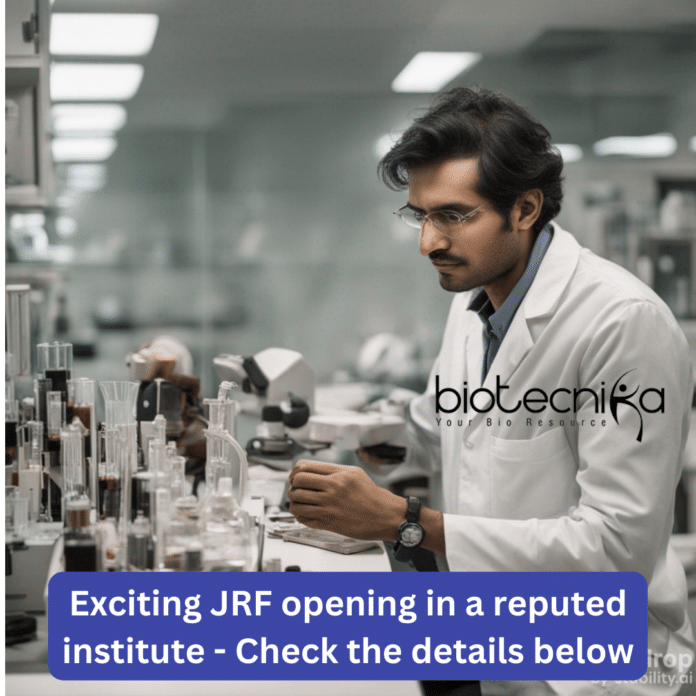Regional Centre for Biotechnology, Faridabad JRF Opening. Life Science MSc Job. Please go through the details and apply online.
This job expires in
Advt. No. 24/Project/2023/HR
Interview for Project-JRF position
Title of Project: Targeting bacterial motility and adherence for inhibition of biofilms from
Pseudomonas aeruginosa.
Job role : Junior Research Fellow (JRF)
Duration: One year.
Age Limit: 26 Years as on 09.10.2023
Principal Investigator: Dr. Deepti Jain, Associate Professor
No. of Position: One
Emoluments: Rs. 31,000/- + 24% HRA per month
How to Apply :
- Interested candidates should apply online by 29th September, 2023, 5:00 PM. Click here to apply online.
- The shortlisted candidates will be informed by 7th October, 2023 via email to appear in the online interview to be held at 10:00 AM onwards on 9th October, 2023.
- For any query, you may contact PI by email: [email protected]
- Please upload copies of the following documents:
1) M.Sc. marksheet in Life Sciences/Biotechnology/Chemistry.
2) National Level JRF eligibility test certificate.
3) Peer-reviewed, published manuscript, if any.
Essential Qualifications: M.Sc. in life sciences or chemistry with NET/DBT-JRF/INSPIRE/GATE or equivalent exam cleared. Minimum 60% marks in Masters or equivalent degree.
Desirable Qualifications:
- Experience in protein purification and biochemical assays. Research experience in X-ray crystallography, Structural biology, or Biophysics lab.
- Good oral and written communication skills.
Check the notification below
Hello friends, we are providing you with some of the interview questions and answers that you can expect for the interview for the Life Science MSc Job. Please prepare and do well at your interview.
1. Can you explain your research experience in protein purification and biochemical assays?
Sample Answer: During my master’s and subsequent research experiences, I actively participated in projects involving protein purification and biochemical assays. I have hands-on experience in protein extraction, purification using techniques like chromatography, and conducting various biochemical assays to assess enzyme activity, protein-protein interactions, and enzymatic kinetics. My work has included characterizing the functions of specific proteins related to bacterial motility and adherence.
2. Have you worked with X-ray crystallography or structural biology techniques before?
Sample Answer: While I haven’t directly worked with X-ray crystallography or structural biology techniques, I am familiar with these areas through coursework and seminars during my academic journey. I have a solid foundation in structural biology principles, and I’m eager to expand my expertise in this field to contribute effectively to this project. I’m confident in my ability to quickly adapt and learn new techniques as needed.
3. Could you provide an example of your written communication skills, particularly in the context of scientific research?
Sample Answer: Certainly. During my master’s program, I authored and co-authored research papers that were published in reputable scientific journals. These manuscripts not only demonstrated my research findings but also showcased my ability to effectively communicate complex scientific concepts and research outcomes. I believe that clear and concise communication is vital in the scientific community, and I strive to maintain this standard in all my written work.
4. What motivated you to apply for this position and work on inhibiting biofilms from Pseudomonas aeruginosa?
Sample Answer: My motivation to apply for this position stems from my deep interest in microbiology and its potential applications in solving real-world problems. Pseudomonas aeruginosa biofilms are notorious for their resistance to antibiotics and the harm they cause in clinical settings. I’m excited about the opportunity to contribute to research that targets bacterial motility and adherence, as it represents a promising approach to combat biofilm formation. Moreover, Dr. Deepti Jain’s work and the research conducted at this institution align perfectly with my career aspirations.
5. Can you describe a challenging situation you faced in a previous research project and how you handled it?
Sample Answer: In a previous research project, we encountered challenges with obtaining consistent results in a biochemical assay. After careful troubleshooting, I realized that there were issues with the quality of some reagents we were using. To address this, I initiated a thorough review of our lab protocols, collaborated with colleagues to identify potential sources of error, and conducted rigorous quality control checks. As a result, we were able to identify and rectify the issue, leading to more reliable and reproducible results. This experience taught me the importance of persistence, collaboration, and meticulous attention to detail in research.
Editor’s Note: Please ensure you are subscribed to the Biotecnika Times Newsletter and our YouTube channel to be notified of the latest industry news. Follow us on social media like Twitter, Telegram, Facebook






























